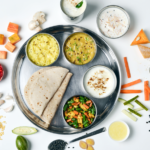
Food items should be harmonious with each other in qualities, stimulate digestion and promote maximum absorption of the essential nutrients. Antagonistic food substances result into indigestion manifested through symptoms like flatulence, acidity etc. and toxification of the body. However, consumed individually, the same food items may get properly digested. When right combinations are not possible, spices help dwindle the contrary effects of incompatible foods to allow healthier digestion.
Fruits should be avoided immediately after meals as the former contains easily digestible sugars whereas the latter is rich in proteins, starches or fats that require more time for digestion. Fruit sugars do not stay in stomach for long but other nutrients do; in combination, sugars will also remain in stomach for longer than they should and ferment. Fruits eaten separately from starches or proteins also provide instant energy to the body.
Bananas with milk is a notorious combination in Ayurveda as it induces toxin formation. It slows down the mind and causes heaviness in body. However, you can take extremely ripe bananas and add cardamom to your banana shake to allow better digestion, in case you want to drink this beverage. Ideally, some gap should be left between the two food items.
Yogurt and sour fruits taken together diminish digestive strength and lead to allergies, cough, cold, sinus congestion and toxins production.
In the same manner, the combination of protein and starch is bad for health as each of the two nutrients needs different acidity levels and enzymes for digestion. Consumed together, our body digests proteins but leaves starches which get decomposed and fermented, in time, turning into poisonous end-products. This combination also hinders salivary digestion of starch. Even protein-protein combination is not recommended as that would be too much for the stomach to digest.
Carbohydrates and acids are another instance of incompatible foods as acid damages the enzyme that digests starches. We should avoid orange juice, fruits, tomatoes etc. with corn, rice, pasta, wheat, barley etc. Adding dairy products like milk to this combination makes matters worse resulting into exhaustion after meals as a lot of energy gets expended on digestion. It also causes digestive problems and acids convert milk into a heavy mucus-forming substance.
Cheese and tomatoes as a combination do not allow proper digestion while cheese and beans taken together lead to bloated stomach and flatulence.
Consumption of raw foods and vegetables in large amounts is also not recommendable as these hamper proper digestion. In case of vegetables, take care to avoid lemon or cucumber with potatoes, eggplant, chillies and tomatoes.
Other Factors
Temperature, time, method of cooking, weather and season are important factors in Ayurveda that make foods beneficial or deleterious. Avoid cold or dry edibles during winters and pungent and hot substances during summers. In general, excessively hot or cold foods are hazardous for our digestive system. Warm and light foods stimulate the digestive fire or agni and secretion of digestive enzymes. Conversely, ice-cold food items weaken the digestive potential. Substances hard to digest should be eaten when digestive power is high like at noon just as light foods should be taken when digestive power is low like at nights. Heating of honey produces poisonous effects and heating of curd is also harmful. Vata-aggravating diets should be avoided after physical activities like exercises and sexual intercourse. Kapha-aggravating diets should be avoided in the morning time. Do not indulge in excessive sweets or eat curd, melons, sesame products, cheese and other Kapha-aggravating edibles at night. Cold foods after an intake of ghee should be abstained from. Milk after one has consumed garlic, radish, tulsi etc. may cause skin diseases.
Different times are ideal for food intake for different body constitutions. Vs should eat in small quantities but frequently. Dawn and dusk is the right time for them to eat. Ps should take maximum three meals a day with lunch as their heaviest meal, preferably, taken at noon. Ks should also make lunch as their heaviest meal and may even skip breakfast.
Gender and age of individuals are considerable. Children should avoid Kapha-stimulating edibles, middle-aged persons should avoid Pitta-stimulating edibles and elderlies should avoid Vata-stimulating edibles. Similarly, women should avoid Kapha-stimulating diets whereas men should avoid Pitta-stimulating edibles.
Water Consumption
Warm water balances all doshas, especially, Kapha and is characterised by lightness which makes it digestion stimulating. It is beneficial for those with fever, asthma and bronchitis. Cold water needs more time for digestion. It should be drunk only in cases of physical fatigue, giddiness, excessive heat, alcohol consumption, puking and aggravation of Pitta. Further, it has adverse effects in gas, hiccups, cold and anorexia.
Before meals, water stimulates Kapha and suppresses digestive fire. During eating, water in small amounts induces digestive strength. By contrast, one can get prone to obesity if he regularly drinks water after meals. The food we consume gets transformed into nutrients and ultimately into energy. Water is a significant agent that helps in the transmittance of nutrients to tissues and other body parts after digestion. But, care should be taken not to drink excessive water as it douses the digestive fire completely and even causes dilution of nutrients. The quantity of water during meals should be such that it fills only one-third of our stomach.

Comments (0)
Back to News